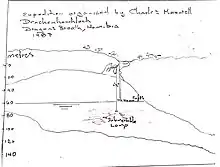Dragon's Breath Cave
Dragon's Breath Cave is a cave located 46 kilometres (29 mi) northwest of Grootfontein in the Otjozondjupa Region of Namibia. It was discovered in 1986 and is named for the moist air rising from its entrance.[1]
The cave contains the world's largest non-subglacial underground lake,[1] with an area of almost 2 hectares (4.9 acres).[2] The lake is located around 100 metres (330 ft) below the surface.[3] Its total depth is unknown, though exploration to date suggests it is at least 100 m.[4] Although it has been reported that the rare fish species, Clarias cavernicola, lives in the lake in the Dragon's Breath Cave, this is an error. It is only known from the nearby Aigamas Cave.[5]

Martyn Farr records in his book "The Darkness Beckons" the exploration of the cave by a team of divers and cavers organised by Charles Maxwell the year after the cave was identified in 1986 by cavers as being of significant size.[6]
See also
- Caves of Namibia
- Great Man-Made River – Network of pipes that supplies water to the Sahara in Libya, a project based on another fossil water store in an arid area in Africa
- Kalahari
- Southern Africa – Southernmost region of the African continent
References
- Kelly, Daniel (24 January 2014). "Dragon's Breath Cave Holds the World's Largest Underground Lake". Lake Scientist. Archived from the original on 1 March 2015. Retrieved 31 May 2016.
- "Dragon's Breath, Namibia". National Geographic. Retrieved 2012-08-28.
- "Namibia's hidden depths". Travel Namibia Magazine. Retrieved 2012-08-28.
- Fileccia, Alessio (2012). "Namibian ground water systems" (PDF). Speleo Diversity. Archived from the original (PDF) on 2012-10-18. Retrieved 2013-01-07. Cite journal requires
|journal=(help) - Proudlove, G.H. (2018–2019). "Clarias cavernicola". cavefishes.org.uk. Retrieved 28 October 2019.
- Farr, Martyn (1991). The Darkness Beckons : The History and development of cave diving. London: Diadem Books. p. 264. ISBN 0-906371-87-2.
External links
- Discovery Channel: Video: Dragon's Breath Cave
- (af) Nuwe duikrekord opgestel ("New dive record set", Republikein, 13 June 2012. URL accessed on 20 October 2015.
- (af) Dieper die aarde se maag in ("Deeper into the bowels of the earth"), Republikein, 13 July 2012. URL accessed on 20 October 2015.